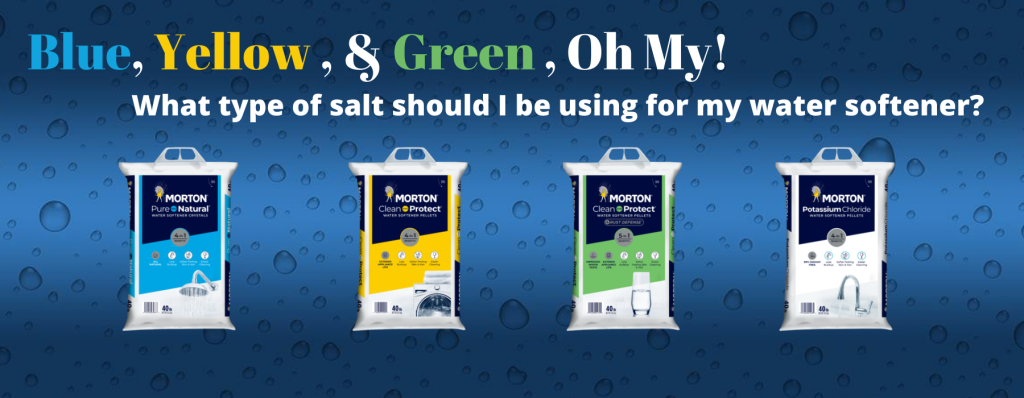We get asked his question a lot and we can understand the confusion surrounding it. In this post we will go over some of the basics softener salt and hopefully answer some frequently asked questions.

4 Rules of Water Softener Salt
Rule #1- Do not use “Rock Salt”
Rule #2- Whether that bag is yellow, green, or blue- Any salt is better than no salt.
Rule #3- Once you choose a bag do your best to stick with it.
Rule #4- If you choose to switch then wait until your salt level is low.
Types of Salts Explained
Coarse Solar Salt (Blue Bag)- This is one of the most common types of salt found. This is the type of salt the we recommend because we find that it can be easily found in a variety of stores like Lowes, Home Depot, etc. This type of salt is the most basic form and we tend to not have as many problems with bridging in brine tanks with it. This type of salt is generally the most affordable form of salt as well.
Pellets (Yellow Bag)- The other most common type of salt is the pellet salt. This type of salt has been cleaned and processed into a pellet shape. Pellets can typically run higher in cost. In some cases of low water usage or infrequent regeneration scenarios, pellets can lose their structure and become mushed and may not dissolve. They can also dry out and harden. When this happens, we generally recommend customer to use the coarse solar salt (blue bag).
Rust/Iron (Green Bag)- The green bags are advertised for water with iron or manganese content. Green bags are pellets with an additive, either sodium-bisulfate or citric acid, which will help dissolve and further clean stubborn iron and manganese from the softening resin. Green bags will be on the higher side of salt cost. We personally find that using a Res-up feeder that drip feeds a cleaning solution can be a more effective and efficient way add resin cleaning products to the backwash process.
Potassium Chloride (Salt Alternative)- A water softener removes hardness from the water by utilizing an ion exchange system which leaches a miniscule amount of salt into the treated water supply. If you wish to avoid the sodium, you can use potassium chloride instead of sodium chloride. However, there are some things to consider.
-Potassium Chloride is found to be 30% less effective in regenerating your softener depending on water quality and softener settings.
-Potassium chloride has been found to harden and mush up with temperature swings in mechanical rooms.
-Potassium chloride is considerably more expensive when compared to other forms of salt.
Block Salt– Salt blocks may be a good option for those who are un able to lift 40-50 lb bags of salt. They are not ideal though due to very little surface area of salt exposed to water resulting in weak brine concentrations.
If you have any questions, please give us a call at 6703-868-3212!


